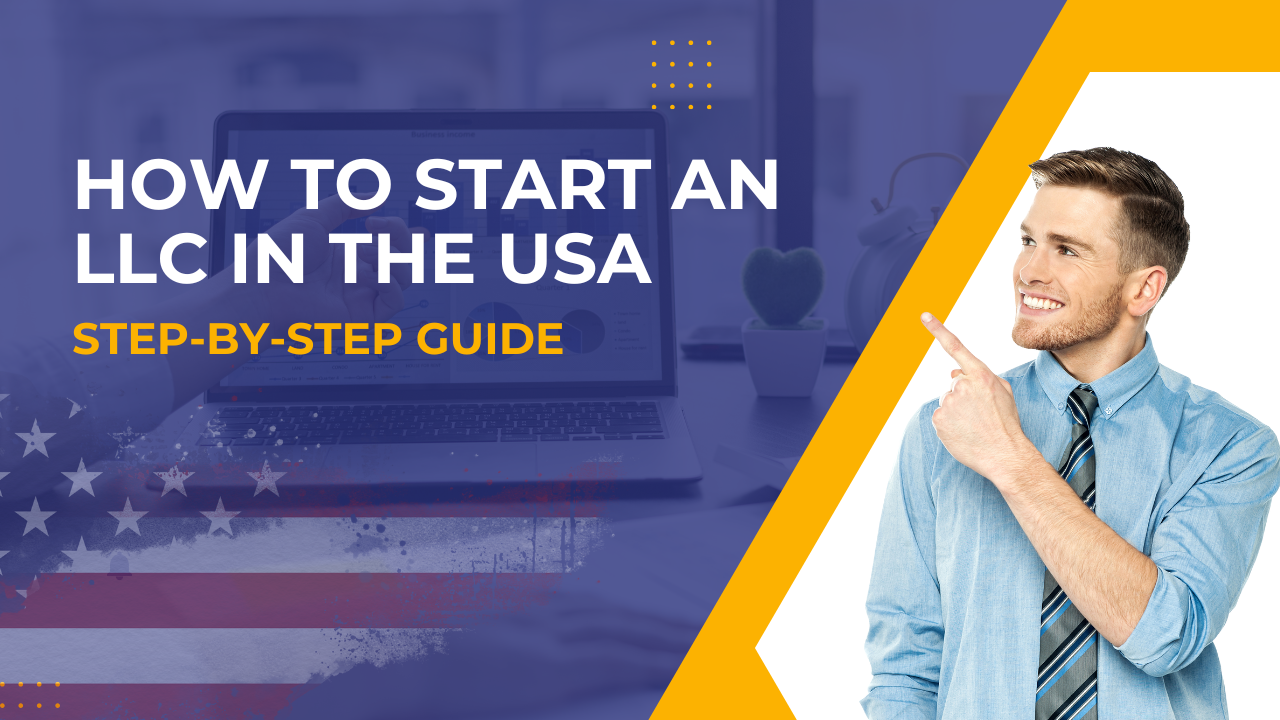Introduction
Thinking of turning your side hustle into a real business? You’re not alone. Every year, thousands of entrepreneurs across the U.S. take the leap—and one of the first and smartest steps they take is forming an LLC.
But let’s be honest:
The legal stuff? Kinda intimidating.
The paperwork, the weird terms like “Articles of Organization,” choosing a registered agent—where do you even start?
That’s exactly why I created this guide.
In the next few minutes, I’ll walk you through exactly how to start your LLC — in plain English, no law degree needed. Whether you’re building an eCommerce brand, launching a consulting gig, or just freelancing legally, this guide will help you go from “confused” to “confident.”
Here’s what you’ll learn: ✅ Why an LLC is the perfect fit for most entrepreneurs
✅ How to pick the best state (yep, it matters!)
✅ A step-by-step checklist you can follow — even if you’ve never done this before
Let’s dive in and make your business official.
🧾 What Is an LLC and Why Should You Start One?
An LLC (Limited Liability Company) is a popular business structure in the United States that combines the flexibility of a sole proprietorship or partnership with the liability protection of a corporation. This means your personal assets are protected if your business runs into legal or financial trouble — and you don’t have to deal with the heavy regulations corporations face.
Whether you’re a freelancer, online seller, consultant, or startup founder, an LLC is often the best mix of protection, simplicity, and professionalism.
Also Read: Top Cybersecurity Tools for Businesses in 2025: The Ultimate Guide to Staying Secure
🛠️ Step-by-Step: How to Start an LLC in the USA
- Choose Your State
Where you form your LLC matters. Most small business owners choose their home state, especially if that’s where they live and operate. But some entrepreneurs choose states like Wyoming, Delaware, or Nevada for tax or privacy benefits — more on that later.
✅ Pro Tip: If you operate in more than one state, you’ll need to register your LLC in each one as a “foreign LLC.”
- Name Your LLC
You can’t just call your LLC whatever you want — each state has rules.
Here’s what to keep in mind:
- Your name must include “LLC” or “Limited Liability Company”
- It must be unique in your state (no duplicates!)
- Avoid restricted words like “bank,” “university,” or “insurance”
- Check if the matching domain name is available — this helps with branding
If you want to use a different name publicly (like “Sunset Coffee” instead of “Sunset Enterprises LLC”), you’ll need to register a DBA (Doing Business As).
- Appoint a Registered Agent
Your registered agent is the person or service that receives legal documents on behalf of your LLC.
You have three choices:
- Be your own registered agent (must have a physical address and be available during business hours)
- Ask a member or employee
- Hire a professional registered agent service
💡 Why It Matters: A professional agent protects your privacy, especially if you don’t want your home address in public records. Plus, they’re always available — even when you’re on vacation.
- File Articles of Organization
This is the official document you submit to your Secretary of State to legally create your LLC. You’ll need:
- Your LLC name and address
- Registered agent information
- Your business purpose
- How your LLC will be managed (by members or managers)
- Duration (perpetual or fixed)
Most states let you file online, and it takes anywhere from 1 day to a few weeks.
💰 Cost Varies: Some states like Kentucky charge as little as $40. Others like Massachusetts? Over $500!
- Create an LLC Operating Agreement
An operating agreement outlines how your LLC will function — it’s your internal rulebook. It’s often not legally required, but it’s highly recommended, especially if you have partners.
Include:
- Member responsibilities and roles
- Ownership percentages
- Voting rights and decision-making
- Profit distribution
- Exit and dissolution rules
Trust me, this document saves you headaches down the road. Even if it’s a one-person LLC, it shows banks and investors you’re serious.
- Get an EIN (Employer Identification Number)
Think of your EIN as your business’s Social Security number. You’ll need it to:
- Open a business bank account
- File taxes
- Hire employees
- Apply for licenses
You can apply for free on the IRS website — no lawyer needed!
- Get Business Licenses and Permits
Depending on your business type and where you’re operating, you might need additional licenses.
Examples:
- Sales tax permit
- Health department license (for food businesses)
- Local zoning permits
Check with your city or county government and use SBA.gov as a starting point.
Must Read: Best Life Insurance Plans in the USA for Families (2025)
🗂️ Quick Reference Table: LLC Formation by State
| Aspect | Examples of State Variations |
| Filing Fees | Wyoming ($100), Montana ($70), Nevada ($400+) |
| State Taxes | No state income tax in TX, FL, NV, WY, SD |
| Admin Complexity | Simple in SD, WY; Complex in CA, NY |
| Privacy & Asset Protection | Strongest in DE, NV, WY |
| Capital & Meeting Rules | Flexible in WY and FL; stricter in CA |
| Foreign Qualification | Required to operate in states outside formation; fees vary |
🤔 How to Choose the Right Registered Agent?
Here’s what I’ve learned from setting up LLCs for clients and myself:
- ✅ Go pro if: You want privacy, operate in multiple states, or are rarely at a physical office
- ✅ Go DIY if: You have a commercial office address and are always available
Personally, I recommend Northwest Registered Agent or ZenBusiness for their reliability and ease of use. They also remind you about deadlines, which is a lifesaver.
🌍 Big Differences Between States: What You Need to Know
Choosing the right state for your LLC isn’t just about fees — it’s about strategy.
✅ Best for Privacy: Wyoming or Nevada
You can stay anonymous as an LLC owner, which is great for high-risk industries or if you just value your privacy.
✅ Best for Startups: Delaware
Delaware is startup-friendly, with flexible corporate laws and a well-respected court system. Big tech companies love it here.
✅ Best for Low Costs: Montana and South Dakota
These states have low fees and no sales tax. If you’re running an eCommerce site or want to save on taxes, they’re solid options.
🏦 Bonus Tip: Don’t Forget a Business Bank Account
Mixing personal and business finances is a big no-no. Once your LLC is formed, head over to your preferred bank with:
- Your EIN
- Articles of Organization
- Operating Agreement
This also makes bookkeeping and taxes easier later.
✨ My Review and Final Thoughts
I’ve helped multiple entrepreneurs through the LLC setup process, and here’s what I always tell them:
LLC formation isn’t as hard as it looks. Most of it is just paperwork and choosing the right services. But what really matters is taking that first step — choosing a name and getting your state’s process started.
If you want peace of mind and don’t have time to do everything yourself, I suggest checking out tools like:
- ZenBusiness – Affordable, user-friendly, and great support
- Northwest Registered Agent – Strong on privacy and compliance
- IncFile – Free LLC formation (you only pay state fees)
You’ll still need to stay on top of annual reports and taxes — but that’s a breeze once you’re up and running.
✅ Final Checklist Before You Launch
Here’s a quick recap to make sure you’ve got all your ducks in a row:
✔️ Chosen your state
✔️ Picked a unique LLC name
✔️ Appointed a registered agent
✔️ Filed Articles of Organization
✔️ Created your operating agreement
✔️ Got your EIN
✔️ Applied for any licenses or permits
✔️ Opened a business bank account
👋 Ready to Start Your LLC?
There’s no perfect time to start your business — but if you’re reading this, you’re already halfway there. Set aside a weekend, follow the steps, and get that LLC off the ground.
Still unsure about your state choice or need help picking a registered agent? Drop your questions below — I’m happy to help!






